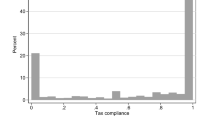Summary. The idea that the final distribution of the tax burden (economic incidence) does not depend on the initial distribution of tax liabilities (statutory incidence) is referred to as the Liability Side Equivalence principle. This paper tests this principle in the laboratory and finds that subjects who actually have to pay the tax carry a higher tax burden. It is argued that this violation of Liability Side Equivalence is due to the fact that a change in the distribution of tax liabilities induces a shift in behaviorally relevant social norms. This shift, in turn, affects the impact of the tax. Our results explain some striking empirical observations and have important theoretical and practical implications.
Similar content being viewed by others
Author information
Authors and Affiliations
Additional information
Reveived: April 30, 1999; revised version: November 15, 1999
Rights and permissions
About this article
Cite this article
Kerschbamer, R., Kirchsteiger, G. Theoretically robust but empirically invalid? An experimental investigation into tax equivalence. Econ Theory 16, 719–734 (2000). https://doi.org/10.1007/PL00020949
Issue Date:
DOI: https://doi.org/10.1007/PL00020949




